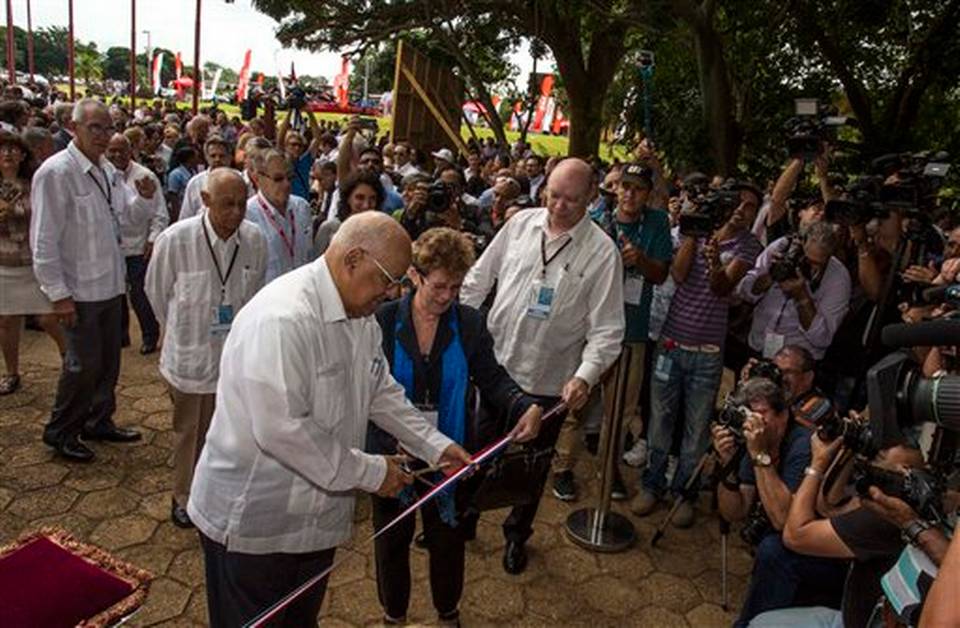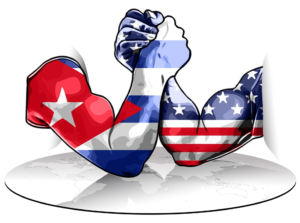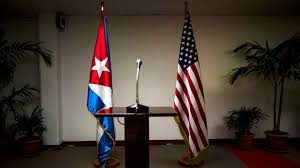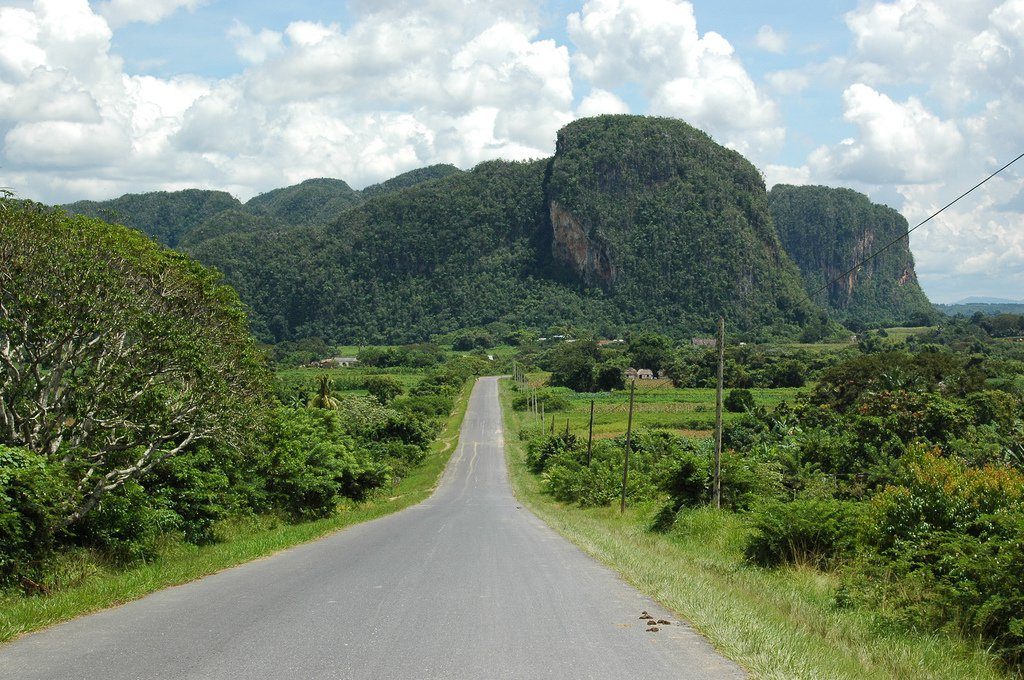 El Minister of foreign trade of Cuba, Rodrigo Malmierca, right, watches as the Vice-President of the Council of Ministers Ricardo Cabrisas Ruiz, left, cut the Ribbon to inaugurate the 34th international fair in Havana, Cuba, Monday, October 31, 2016. Sample of a week featuring exhibitors from 75 countries. The Cuban Government maintains the monopoly on imports and exports and virtually in the marketing of products within the country, making it the final arbiter of the business that materialize on the island.
El Minister of foreign trade of Cuba, Rodrigo Malmierca, right, watches as the Vice-President of the Council of Ministers Ricardo Cabrisas Ruiz, left, cut the Ribbon to inaugurate the 34th international fair in Havana, Cuba, Monday, October 31, 2016. Sample of a week featuring exhibitors from 75 countries. The Cuban Government maintains the monopoly on imports and exports and virtually in the marketing of products within the country, making it the final arbiter of the business that materialize on the island.
![]() For a time Saúl Bernthal and Horace Clemmons were the face of the thaw in relations between the United States and Cuba.
For a time Saúl Bernthal and Horace Clemmons were the face of the thaw in relations between the United States and Cuba.
Retired software entrepreneurs captured headlines of news around the world to win permission from the Government of Barack Obama to build the first American factory in Cuba since 1959. The Cuban authorities praised plans to build small tractors in the special zone development Mariel West of Havana.
But after more than one year of courtship, the Cuban Government said Bernthal, and Clemmons to leave their plans of building tractors in Cuba, without any explanation, said Bernthal on Monday.
Month and a half ago, the first tractors began to leave the Assembly line… but in the village of Fyffe, Alabama, which has about 1,000 inhabitants.
“The production of tractors in Mariel was not going to happen,” said Berenthal.
After two years of the campaign of Obama to normalize diplomatic relations with Cuba, its initiative to expand economic ties is producing few results. Except for some striking agreements for major American brands, the formal trade between the two countries remains minimal.
The mood was off among U.S. companies that displayed their products and services in the international fair of Havana, the largest trade fair of general interest on the island. While Cuba announced with fanfare the new agreements reached with Russia and Japan, the US corporate representatives in charge of exhibition stands in a ward shared with Puerto Rico said they saw few prospects in the short term to do business with Cuba.
“We know that we have to be here, to show our willingness to be here,” said Diego Aldunate, director for Latin America of Rust-Oleum paints, based in Illinois.
He and a colleague, Oscar Rubio, showed that they were awaiting to get potential customers of the small sector of co-operative ownership of workers in Cuba halted in his display, but for average late had not become anyone.
The Cuban Government maintains a monopoly on imports and exports and in virtually all sales of products within the country, which makes the State bureaucracy in the final arbiter of the businesses that are specified.
“How complicated is that the Distributor is the Government and we do not know how to operate,” said Rubio.
Obama has implemented six rounds of regulations that make perforations in the trade embargo that United States imposed on Cuba for half a century, which already allow imports, exports, sales to American investment limited on the island and the Socialist Government. Cuba has authorized to operate in its territory the hotels Starwood, reserve housing Airbnb and 10 airlines in United States service.
Cuban authorities blame the remaining provisions of the embargo as the real obstacle to increased trade with the North American country, and constantly criticize what they call “lock”.
“The blockade remains in effect due to the absurd commercial and financial blockade,” said Rodrigo Malmierca, Secretary of Commerce, at the opening ceremony of the fair on Monday. “This causes great damage to the Cuban people and is the main obstacle in the process towards normalization of relations between Cuba and the United States.”
Observers make note that small but growing private sector in Cuba has been able to flourish and produce tens of thousands of new jobs despite the constraints of the embargo. A number of untold millions of dollars has flowed to Cuba in the past two years, which has funded thousands of new hostels small including breakfast and dozens of new restaurants in the capital as the thaw with the United States unleashed a boom in tourism to the island.
Some see the stagnation of official trade with the Americans as a conscious of the Cuban Government decision to limit trade to some high-profile Apple bites while channeled most of the business to European and Asian companies, in order to keep the community business hungry American more and put pressure on Congress to put an end to the embargo.
“The Cuban Government is using the interest that have U.S. companies as bait to attract the interest of companies from other countries,” said John Kavulich of the Economic Council and trade between the United States and Cuba, a private group that produces analyses – skeptical, for the most part – the prospects for trade between the two countries.
“The Cuban Government is saying: ‘Give you nothing more than absolutely necessary to U.S. companies,’ in such a way that the companies continue salivating waiting for illusory potential opportunities.” There’s more inspiration and aspiration than reality”, he added.
Agencies/AP/Michael Weissenstein/Internet Photos/Arnold Varona/TheCubanHistory.com
THE CUBAN HISTORY, HOLLYWOOD.

![]() NEGOCIOS ESTADOUNIDENSES VEN UN PANORAMA SOMBRÍO EN LAS NEGOCIACIONES CON CUBA.
NEGOCIOS ESTADOUNIDENSES VEN UN PANORAMA SOMBRÍO EN LAS NEGOCIACIONES CON CUBA.

El ministro de Comercio Exterior de Cuba, Rodrigo Malmierca, a la derecha, observa mientras el vicepresidente del Consejo de Ministros, Ricardo Cabrisas Ruiz, a la izquierda, corta el listón para inaugurar la 34ta Feria Internacional en La Habana, Cuba, el lunes 31 de octubre de 2016. La muestra de una semana cuenta con la participación expositores de 75 países. El gobierno cubano mantiene el monopolio en las importaciones y exportaciones y prácticamente en la comercialización de productos dentro del país, lo que lo convierte en el árbitro final de los negocios que se concreten en la isla.
Durante un tiempo Saúl Berenthal y Horace Clemmons fueron el rostro del deshielo en las relaciones entre Estados Unidos y Cuba.
Los empresarios de software retirados captaron encabezados noticiosos en todo el mundo al ganar el permiso del gobierno de Barack Obama de construir la primera fábrica estadounidense en Cuba desde 1959. Las autoridades cubanas elogiaron sus planes de armar tractores pequeños en la Zona Especial de Desarrollo Mariel al oeste de La Habana.
Pero después de más de un año de cortejo, el gobierno cubano le dijo a Berenthal y a Clemmons que abandonaran sus planes de construir tractores en Cuba, sin darles ninguna explicación, dijo Berenthal el lunes.
Hace mes y medio, los primeros tractores comenzaron a salir de la línea de ensamblado… pero en el poblado de Fyffe, en Alabama, que tiene unos 1.000 habitantes.
“La producción de los tractores en Mariel no iba a ocurrir”, dijo Berenthal.
Tras dos años de la campaña de Obama para normalizar las relaciones diplomáticas con Cuba, su iniciativa encaminada a ampliar los vínculos económicos está dando pocos resultados. Salvo por algunos acuerdos llamativos para grandes marcas estadounidenses, el comercio formal entre los dos países sigue siendo mínimo.
El ánimo estaba apagado entre las compañías estadounidenses que exponían sus productos y servicios en la Feria Internacional de La Habana, la mayor feria comercial de interés general de la isla. Mientras Cuba anunciaba con fanfarrias los nuevos acuerdos alcanzados con Rusia y Japón, los representantes corporativos estadounidenses a cargo de puestos de exhibición en un pabellón compartido con Puerto Rico dijeron que veían pocas perspectivas a corto plazo para hacer negocios con Cuba.
“Sabemos que tenemos que estar aquí, mostrar nuestra disposición de estar aquí”, dijo Diego Aldunate, director para Latinoamérica de las pinturas Rust-Oleum, con sede en Illinois.
Él y un colega, Óscar Rubio, indicaron que estaban aguardando que posibles clientes del pequeño sector de cooperativas propiedad de los trabajadores de Cuba se detuvieran en su puesto de exhibición, pero para media tarde no había llegado nadie.
El gobierno cubano mantiene un monopolio en las importaciones y exportaciones y en prácticamente todas las ventas de productos dentro del país, lo que convierte a la burocracia estatal en el árbitro final de los negocios que se concretan.
“Lo complicado es que el distribuidor es el gobierno y no sabemos cómo va a funcionar”, dijo Rubio.
Obama ha implementado seis rondas de regulaciones que hacen perforaciones en el embargo comercial que Estados Unidos le impuso a Cuba hace medio siglo, las cuales ya permiten importaciones y exportaciones, ventas al gobierno socialista e inversión estadounidense limitada en la isla. Cuba ha autorizado que operen en su territorio los hoteles Starwood, el servicio de reserva de viviendas Airbnb y 10 aerolíneas de Estados Unidos.
Las autoridades cubanas culpan a las cláusulas restantes del embargo como el verdadero obstáculo a un mayor comercio con el país norteamericano, y constantemente critican lo que llaman “el bloqueo”.
“El bloqueo permanece vigente debido al absurdo bloqueo comercial y financiero”, afirmó Rodrigo Malmierca, secretario de Comercio, en la ceremonia inaugural de la feria el lunes. “Este provoca grandes daños al pueblo cubano y es el principal obstáculo en el proceso hacia la normalización de relaciones entre Cuba y Estados Unidos”.
Los observadores hacen notar que el pequeño pero creciente sector privado de Cuba ha podido florecer y producir decenas de miles de empleos nuevos a pesar de las constricciones del embargo. Una cantidad incalculable de millones de dólares ha fluido a Cuba en los últimos dos años, la cual ha financiado miles de nuevos hostales pequeños con desayuno incluido y decenas de nuevos restaurantes en la capital a medida que el deshielo con Estados Unidos desata un auge en el turismo hacia la isla.
Algunos ven el estancamiento del comercio oficial con los estadounidenses como una decisión consciente del gobierno cubano para limitar el comercio a algunos mordiscos de alto perfil a la manzana mientras canaliza la mayoría de los negocios hacia compañías europeas y asiáticas, con el fin de mantener a la comunidad empresarial norteamericana hambrienta de obtener más y presionar al Congreso para que ponga fin al embargo.
“El gobierno cubano está utilizando el interés que tienen las empresas estadounidenses como el cebo para atraer el interés de las compañías de otros países”, dijo John Kavulich del Consejo Económico y Comercial entre Estados Unidos y Cuba, un grupo privado que produce análisis —escépticos, en su mayor parte— de las perspectivas de comercio entre ambos países.
“El gobierno cubano está diciendo: ‘No le demos nada más de lo absolutamente necesario a las compañías estadounidenses’, de forma que las empresas sigan salivando a la espera de oportunidades potenciales ilusorias. Hay más inspiración y aspiración que realidad”, agregó.
Agencies/AP/ Michael Weissenstein/Internet Photos/ Arnoldo Varona/ TheCubanHistory.com
THE CUBAN HISTORY, HOLLYWOOD.






